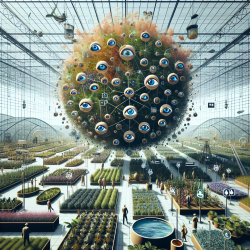How TinyEYE Can Learn from Almería’s Greenhouse Horticulture Challenges

Globally, the demand for food is putting unprecedented pressure on agricultural systems, and this is particularly evident in Almería, Spain. Almería’s greenhouse horticulture sector has grown rapidly since the 1960s, providing significant social and economic benefits but also causing environmental and social challenges. A recent research article titled "Six Collective Challenges for Sustainability of Almería Greenhouse Horticulture" identifies six key challenges and provides insights that can help TinyEYE improve its services and encourage further research.
1. Governance Based on Shared Responsibility
The research emphasizes the need for governance systems that promote shared responsibility for sustainability. For TinyEYE, this means fostering a culture of collaboration among therapists, educators, and administrators to ensure that online therapy services are both effective and sustainable.
2. Sustainable and Efficient Use of Resources
Almería faces severe water management issues. TinyEYE can draw parallels by ensuring efficient use of digital resources and data management systems. Implementing best practices for resource management can lead to more effective and sustainable therapy services.
3. Biodiversity Conservation
The conservation of biodiversity in Almería highlights the importance of maintaining diverse ecosystems. In the context of TinyEYE, this translates to promoting diverse therapeutic approaches and personalized plans to meet the unique needs of each student.
4. Implementing a Circular Economy Plan
The circular economy concept in Almería involves recycling and sustainable waste management. For TinyEYE, this could mean developing systems to continually update and improve therapy resources, ensuring they remain relevant and effective over time.
5. Technology and Knowledge Transfer
The transfer of technology and knowledge is crucial for Almería’s sustainability. Similarly, TinyEYE should focus on continuous professional development and the adoption of new technologies to enhance the quality of online therapy services.
6. Image and Identity
Improving the image and identity of Almería’s agricultural sector involves addressing social issues and promoting positive stories. TinyEYE can enhance its image by showcasing success stories and demonstrating the positive impact of its services on students’ lives.To read the original research paper, please follow this link:
Six Collective Challenges for Sustainability of Almería Greenhouse Horticulture.
Citation: Castro, A. J., López-Rodríguez, M. D., Giagnocavo, C., Gimenez, M., Céspedes, L., La Calle, A., Gallardo, M., Pumares, P., Cabello, J., Rodríguez, E., Uclés, D., Parra, S., Casas, J., Rodríguez, F., Fernandez-Prados, J. S., Alba-Patiño, D., Expósito-Granados, M., Murillo-López, B. E., Vasquez, L. M., & Valera, D. L. (2019). Six collective challenges for sustainability of Almería greenhouse horticulture. International Journal of Environmental Research and Public Health, 16(21), 4097. https://doi.org/10.3390/ijerph16214097
